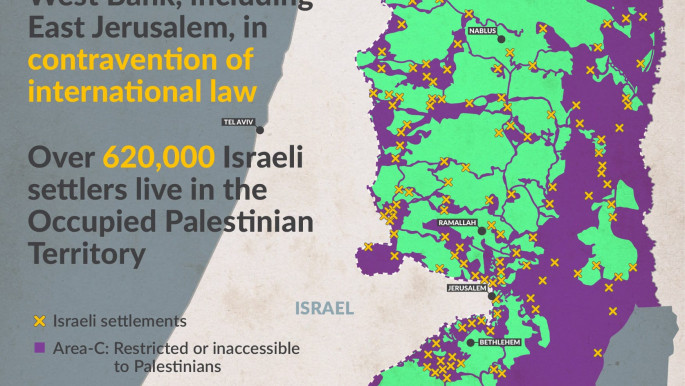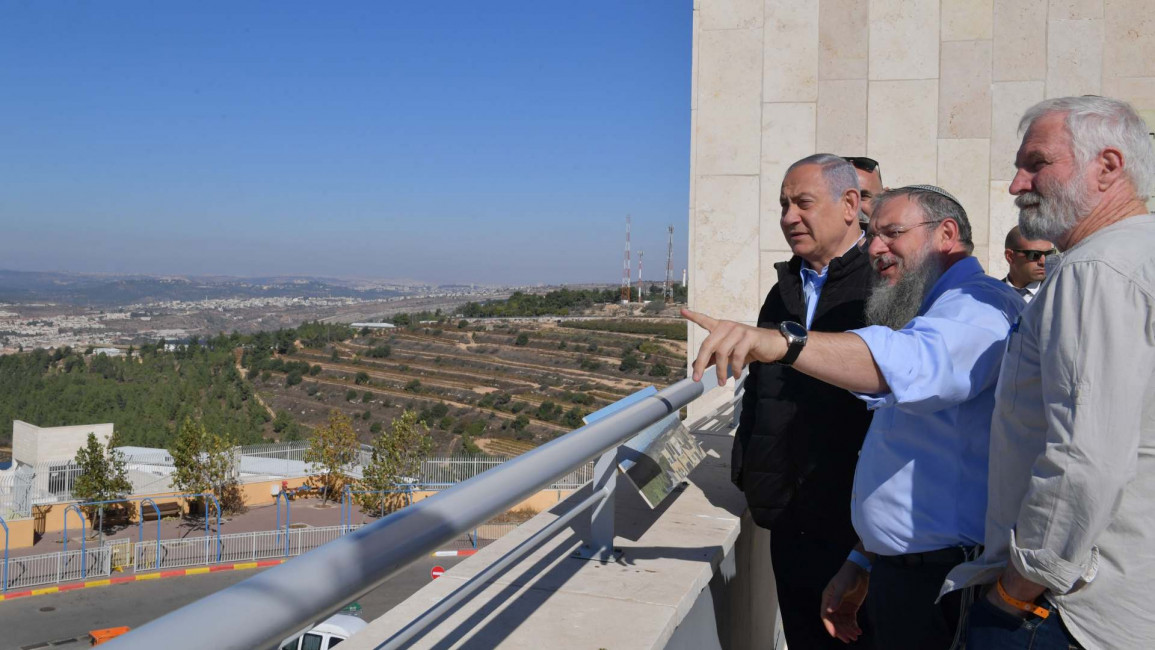Israel to start West Bank annexation with settlement blocs
Israel to start West Bank annexation with settlement blocs
Israeli Prime Minister Benjamin Netanyahu hopes to ease international tensions by dragging out the annexation process, officials say.
3 min read
Plans to annex the Jordan Valley could escalate tensions with neighbouring Jordan [Getty]
Israel's annexation drive will initially target three major settlement blocs in the occupied West Bank, officials have said.
The Israeli unity government, headed by Prime Minister Benjamin Netanyahu, has pledged to go ahead with annexing large swathes of the occupied Palestinian Territories from July.
But Netanyahu is faced with several challenges to realising what has long been an ambition of the Israeli right.
With settlements spotted across the entirety of the occupied West Bank, mapping how they will be integrated into Israel proper ultimately impinges on the future of an independent Palestinian state.
Launched earlier this year shortly after the unveiling of the Trump administration's so-called Israel-Palestine peace plan, the annexation mapping process could drag on for months, according to Israeli officials.
The Israeli premier plans to focus on select settlement blocs rather than declaring sovereignity over all settlements and the strategic Jordan Valley on 1 July as initially planned, official sources told The Times of Israel.
The Etzion and Ma'ale Adumim blocs - respectively home to around 70,000 and 40,000 settlers - are located close to Jerusalem, which Israel seeks as an "undivided" capital.
While located deeper into the West Bank, the Ariel settlement bloc - home to at least 20,000 Israelis - is easily linked by roads and smaller settlements to the suburbs of Tel Aviv, easing the mapping process.
Speaking on condition of anonymity, officials with knowledge of the mapping process told The Times of Israel that the government hopes to assuage tensions with neighbouring Jordan by dragging out the annexation drive.
Jordan is one of only two Arab states to have signed a peace treaty with Israel, but the neighbouring kingdom has promised to oppose annexation, considered illegal under international law.
Analysts have warned the annexation bid could lead to the breakdown of the 1994 Wadi Araba treaty. Particularly contentious is the planned annexation of the Jordan Valley, a fertile and strategic strip of land located on the border with Jordan.
Netanyahu plans to announce the annexation of the Ariel, Etzion and Ma'ale Adumim blocs unilaterally at the beginning of July, the official sources said.
The premier will then await US approval of Israel's annexation of other West Bank territories after the mapping process is complete, the sources added.
By dragging out the annexation process, rather than rolling full steam ahead, Netanyahu hopes to cultivate tacit international approval of the move.
The government is also wary of the process continuing for too long, fearing that a Democratic victory in November's US elections could put an end to the annexation drive.
Read more: Israeli settlements built on private Palestinian land ruled illegal
On Tuesday, Prime Minister Mohammed Shtayyeh announced the Palestinian Authority had proposed a counter-proposal to the Trump administration's plan.
The Palestinian plan involves the creation of a "sovereign Palestinian state, independent and demilitarised", Shtayyeh said.
The proposal allows for "minor modifications of borders where necessary", the premier added, hinting at land swaps with Israel.
Around 450,000 Israelis live in the more than 100 West Bank settlements coveted by the Israeli government, alongside more than 3 million Palestinians.
Israel occupied the West Bank and East Jerusalem in 1967. It later annexed East Jerusalem in a move widely considered illegal under international law.
Follow us on Facebook, Twitter and Instagram to stay connected
The Israeli unity government, headed by Prime Minister Benjamin Netanyahu, has pledged to go ahead with annexing large swathes of the occupied Palestinian Territories from July.
But Netanyahu is faced with several challenges to realising what has long been an ambition of the Israeli right.
With settlements spotted across the entirety of the occupied West Bank, mapping how they will be integrated into Israel proper ultimately impinges on the future of an independent Palestinian state.
Launched earlier this year shortly after the unveiling of the Trump administration's so-called Israel-Palestine peace plan, the annexation mapping process could drag on for months, according to Israeli officials.
The Israeli premier plans to focus on select settlement blocs rather than declaring sovereignity over all settlements and the strategic Jordan Valley on 1 July as initially planned, official sources told The Times of Israel.
The Etzion and Ma'ale Adumim blocs - respectively home to around 70,000 and 40,000 settlers - are located close to Jerusalem, which Israel seeks as an "undivided" capital.
 |
| [Click to enlarge] |
While located deeper into the West Bank, the Ariel settlement bloc - home to at least 20,000 Israelis - is easily linked by roads and smaller settlements to the suburbs of Tel Aviv, easing the mapping process.
Speaking on condition of anonymity, officials with knowledge of the mapping process told The Times of Israel that the government hopes to assuage tensions with neighbouring Jordan by dragging out the annexation drive.
Jordan is one of only two Arab states to have signed a peace treaty with Israel, but the neighbouring kingdom has promised to oppose annexation, considered illegal under international law.
Analysts have warned the annexation bid could lead to the breakdown of the 1994 Wadi Araba treaty. Particularly contentious is the planned annexation of the Jordan Valley, a fertile and strategic strip of land located on the border with Jordan.
Netanyahu plans to announce the annexation of the Ariel, Etzion and Ma'ale Adumim blocs unilaterally at the beginning of July, the official sources said.
The premier will then await US approval of Israel's annexation of other West Bank territories after the mapping process is complete, the sources added.
By dragging out the annexation process, rather than rolling full steam ahead, Netanyahu hopes to cultivate tacit international approval of the move.
The government is also wary of the process continuing for too long, fearing that a Democratic victory in November's US elections could put an end to the annexation drive.
Read more: Israeli settlements built on private Palestinian land ruled illegal
On Tuesday, Prime Minister Mohammed Shtayyeh announced the Palestinian Authority had proposed a counter-proposal to the Trump administration's plan.
The Palestinian plan involves the creation of a "sovereign Palestinian state, independent and demilitarised", Shtayyeh said.
The proposal allows for "minor modifications of borders where necessary", the premier added, hinting at land swaps with Israel.
Around 450,000 Israelis live in the more than 100 West Bank settlements coveted by the Israeli government, alongside more than 3 million Palestinians.
Israel occupied the West Bank and East Jerusalem in 1967. It later annexed East Jerusalem in a move widely considered illegal under international law.
Follow us on Facebook, Twitter and Instagram to stay connected


![President Pezeshkian has denounced Israel's attacks on Lebanon [Getty]](/sites/default/files/styles/image_684x385/public/2173482924.jpeg?h=a5f2f23a&itok=q3evVtko)



 Follow the Middle East's top stories in English at The New Arab on Google News
Follow the Middle East's top stories in English at The New Arab on Google News


